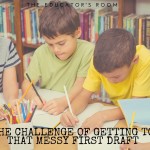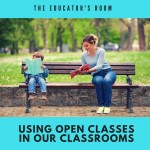On the first day of each new school year, after introductions and a syllabus review, I make a promise to each of my classes.
“I can promise that other than the state tests over which I have no control, you will never take a test in my class.”
(Queue nods of approval and general happy murmurings)
I then give them the follow up: “This is because I assess you through writing. In this class, you will write.”
(Queue not-so-happy grumblings)
I then introduce them to their first writing assignment. Poetry.
(Queue stone cold silence)
I know what some might be thinking, and I assure you that I don’t do this to be cruel.
There are few teachers who deny the importance of the first days of school. It is when routines and norms are established. In this critical period, students are watching. They want to know what is expected of them and, more importantly, what they can get away with. One of my main expectations is that my students write, and if I want that expectation to be as clear as it can be, I need to do more than make an announcement and weight writing assignments more heavily. I need to establish it as part of the culture from day 1.
Beyond a culture of writing, I want to create an environment where my students feel empowered. Upon seeing the assignment, students realize that I am not going to force them to craft a perfect sonnet or map out a rhyme scheme. Instead, what we do is based on Linda Christensen’s lesson from Chapter 1 of Rhythm and Resistance: Teaching Poetry for Social Justice. In this lesson, students study the poem “For My People” by Margret Walker and craft their own piece celebrating those they care about. In her poem, Walker uses techniques like repetition and extended lists that not only make the piece more powerful, but are techniques that students can recognize and replicate in their own work. The intention is to empower my students, many of which resist writing, and I usually find that after an initial brainstorming session, the vast majority jump right into drafting without putting up a fight.
Another benefit of the nature of this piece is that it gives me a way to get to know my students, not just as writers, but as people. As I read odes to gamers, soccer players, “my girls”, and “my congregation”, I get a glimpse into some of the things my students hold dear. Tributes to terrible spellers and the unfortunate clumsy celebrate quirks and everyday trials. In poems that wish strength to immigrants or children of poverty, I see the hardships that too many have had to overcome, and in shout-outs to fellow students, I see positivity and a willingness to persevere.
Furthermore, my most important class routines surround the drafting and revision process. The sooner we begin our first piece, the sooner we can set up our digital portfolios and work on communication within a response group. Since the first writing is a shorter work of poetry, we have time to focus on what I expect for every step of the revision process and a chance to practice before we dive into essay writing where students will be expected to execute the same routines but with a piece that takes longer to prepare for and write. With this poem, I can place a focus on process without sacrificing product. Students are still expected to take the poem through a full set of revisions as they would any other piece. They get feedback from me and from fellow students and develop the poem using that feedback until they have something they can be proud of.
So this is why we write from day 1, because I have found that with the right approach and the right piece, it is the best way for me to establish routines, expectations, and environment right from the beginning in a manner that can give my students a win, a win that will hopefully encourage them to try on the next, more complicated piece of writing.
And I promise, once the students know that I’m not trying to defeat them with poetry on day 1, the stone cold silence doesn’t last for long.





